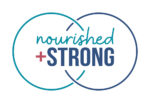Why Socializing Might be Healthier for you than your Kale Salad
At Nourished & Strong, we pride ourselves on the community we have built (and are continuing to build!) – not solely because it’s fun to connect with like-minded people, but also because safe social engagements are critical to longevity and improved overall health.
Social engagement has been linked to decreased risk for:
- Heart disease and stroke
- Depression
- Anxiety
- Addiction
- Type 2 diabetes
- Dementia
- Early death
Humans are literally hard-wired to interact with other humans! According to the polyvagal theory, we have three subcircuits of our autonomic nervous system (ANS) hierarchy:
- Social communication
- e.g. feelings of connectedness and belonging
- The newest circuit in humans’ evolutionary history
- Mobilization
- e.g. “fight or flight” or activation responses
- The second newest circuit in humans’ evolutionary history
- Immobilization
- e.g. feigning death or behavioral “shutdown”
- The oldest, most primitive circuit in humans’ evolutionary history
In this hierarchy of adaptive responses in how we engage with the world around us, the newest circuit is used first; we go from “least primitive” to “most primitive” response. If the newest circuit (“social communication”) fails to provide safety, the older circuits (“fight or flight” and “behavioral shutdown”) are recruited in that order.
Meaning, if social connectedness can’t be resourced, the human body will then utilize the next “tier” down – fight or flight. If this doesn’t elicit the needed response, our bodies will then fall to the next tier – immobilization. Staying socially connected is a preventative measure to keep us from falling down the chain towards emotional and physiological “shutdown”.
We see this play out more than we would think. In movies, there is often a trope of a “mean, irritable old man” that lives alone in isolation. What sometimes gets lost in translation: it’s less likely that he lives alone because he’s irritable; he is likely irritable (at least in part) as a result of living in an isolated environment.
- Another example: If you are still in park after the stoplight in front of you has turned green, the driver behind you may gently beep their horn. If you are grounded and connected to the world around you, you may be surprised by the honk, but you are able to wave back to the driver and step on the gas. If you are in the hyperactivated, mobilized state, you may find yourself triggered by the horn. You might give the other driver the finger, speed off, and mutter to yourself until your next destination. And if you have gotten to the point of immobilization, you may not even notice the honk at all because you are disconnected from the sensory world around you.
Engaging in healthy connection with people around us serves as a “protective coating” in a way. The social communication circuit uses the myelinated vagus nerve, which inhibits the sympathetic nervous system and dampens the HPA axis response.
What does this mean? It means when we are socially connected:
- Our heart rate slows
- Our cortisol levels are reduced
- Our inflammatory response is decreased
Because our bodies crave this state of calm, our brains are constantly working in the background of every situation to assess the safety level through a process called neuroception. For some individuals, social interactions may have lacked feelings of safety. Anything from light teasing to actual threat of violence can read as: “this situation is no longer safe”. This can often lead people to retreat – to further isolate themselves because of these negative connotations with socializations. The same is often true in eating disorder behavior – we start avoiding social situations with food, stop confiding as much in our friends, and hyperfixate only on food and body.
But this has the opposite effect that we want it to. Humans are social creatures, and we can’t heal ourselves in isolation. In situations where social engagement has felt unsafe in the past, is that much more important to find a group that brings you a sense of safety and security in the future. We all need a social “protective coating”!
And we would love to be one of those groups for you. Find a sense of safety and belonging with us at Nourished & Strong. Book a discovery call and find your community today.



